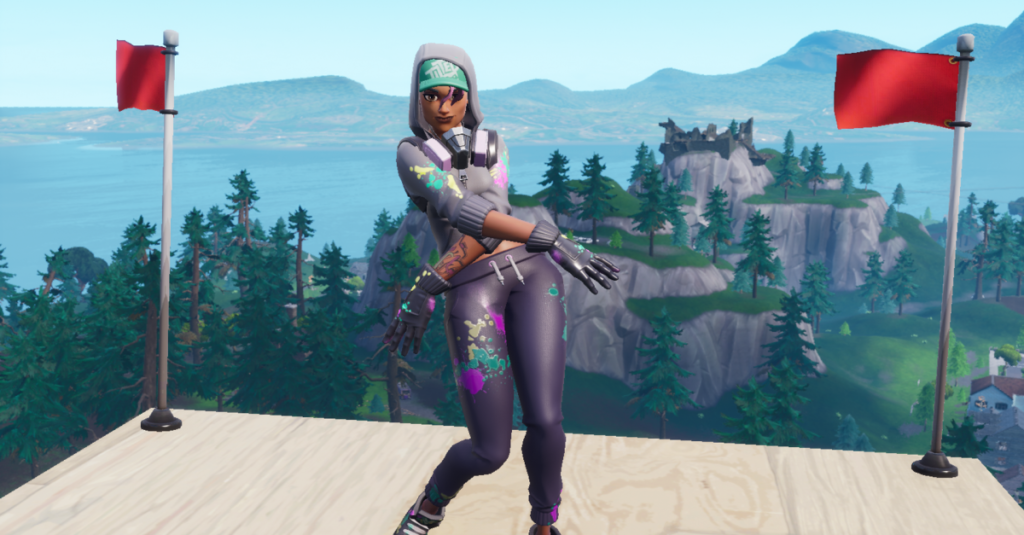If John Wick prances around your virtual dead body with a giant L on his forehead and no one is around to see it, did it really happen? Fortnite players have had to contend with a sillier version of the classic philosophical quandary since mid-2024, when developer Epic Games introduced a setting called “See Confrontational Emotes.”
The See Confrontational Emotes setting means that a specific set of in-game expressions are no longer visible to other players by default, unless they’re performed by friends — instead, players must turn this setting off in order to see animations that Epic has deemed hostile. These include classic emotes, like the trombone-heavy Take The L, and more controversial options, like the Whip Crack emote that was released in conjunction with a Catwoman skin. Some options, like Laugh It Up, could be seen as mean-spirited regardless of the context, especially since it’s accompanied by a donkey’s mocking bray. There are also seemingly benign inclusions, like the banana-throwing emote, Make It Plantain.
Players can turn said emote setting off, or specify that they’d never like to see Confrontational Emotes at all. If players own emotes, they can still use them; on their screens, the animations will play as they would normally. But for everyone else, it’ll appear as if the opponent is merely standing still, quietly.
See Confrontational Emotes was an unusual update, especially for a game that exploded into the cultural consciousness in no small part due to its vast number of dances — like Take The L, a classic emote that was so ubiquitous at one point, even sports stars mimicked the moves in real life. At the time, most players received the news with some skepticism and surprise, as evidenced by responses to the announcement. “They are just annoying tbh not really confrontational,” replied one user on X (formerly Twitter). “What’s stopping anyone from just T-bagging the corpses like the good old days?” asked popular animator RubberRoss. “Seems silly.”
Other users seemed receptive, but wondered why Fortnite players couldn’t hand-select the emotes they did not want to see. After all, what feels “confrontational” could vary from person to person. Some might break a controller after a frustrating death in Fortnite, sure, but others see negative emotes as a core aspect of competition. “No reason for this change,” wrote another X user. “If you get eliminated and someone does Take The L on you that has to motivate you to get better at the game.”
For other onlookers, it wasn’t really a debate over censorship — instead, the whole thing became an economical issue. “Emotes were bought with the expectation of other players seeing you emote as well,” replied one X user who was hoping to see a refund.
Perhaps this turn of events was inevitable in the wake of Fortnite’s 2021 attempt to celebrate Martin Luther King Jr. At first, the map — which was released as a stand-alone mode in conjunction with Time magazine — allowed players to walk through the Lincoln Memorial. Here, participants could watch King’s historic “I Have a Dream” speech. But Epic Games made the mistake of allowing emotes during the ceremony, which inevitably devolved into players spamming the whip emote. Eventually, emotes were turned off — but by then, footage of players decked in all-white costumes whipping pictures of MLK had already gone viral.
While the Confrontational Emotes setting wouldn’t arise until three years later, it is one of many changes seemingly made to rein in Fortnite’s chaotic image. In late 2023, the publisher began age-gating maps and skins that it deemed unsuitable for players under the age of 10. Seven percent of the thousands of available cosmetics, from costumes to pickaxes, were affected under the new rules — specifically, Epic censored skins with weapons and adjacent accessories, like gun holsters and grenades. Much like the emote settings that would come a year later, the age restrictions were met with furor from players who had spent money on skins that came with no asterisks. It was a change that, for some, also felt nonsensical. Fortnite has expanded to include things like a racing mode and a rhythm game mode, but generally speaking, people associate the game with guns to begin with: Fortnite’s most popular mode is a third-person shooter. A few missing weapons won’t change that.
This setting came the same year that Epic Games announced a $1.5 billion partnership with the famously family-friendly Disney for digital experiences within Fortnite. Cosmetics owned by Marvel, a Disney property, have long been a Fortnite mainstay. The partnership between the two megacorps aimed to build something akin to a virtual Disneyland, fit with digital attractions that are open 24 hours a day and do not require travel or thousands of dollars to visit. It seems unlikely that Disney would allow something as racialized as a whipping emote to come anywhere near a patriotic character like Captain America.
Speaking to a few players directly, most of them are reasonable about such changes. Roodie, for example, loves to spring the Rick Astley’s “Never Gonna Give You Up” emote after a satisfying kill. Like most, Roodie considers a Victory Royale a perfect excuse to break into dance. And Roodie has definitely been on the other end of an “upsetting” emote gloat. While Roodie can see Confrontational emotes, they also said they could live without emotes at all.
“I don’t want to impact anyone’s gameplay enjoyment,” Roodie said. “So if they need to block out emotes, I can understand that.”
Water Me Loan, another Fortnite player, does have the Confrontational setting turned on, meaning that they cannot see the handful of animations blocked by Epic. But based on our interview, it seemed less like a conscious decision than simply the one available by default. On the whole, Water appreciates emotes.
“I believe that in-game emotes are a part of the Fortnite Experience,” Water said, “like Thanking the Bus Driver or Building a Fort.
“I would personally prefer it if other players see my emotes, because if they can’t see then what would be the point?” Water added.
But regardless of whether or not players have confrontational emotes censored, it’s still likely that the setting hasn’t curtailed hostile exchanges on the platform.
“90% of emotes are toxic,” opined one Reddit user in a thread about confrontational emotes. “That’s the whole point. You’re dancing on someone’s dead body. It’s celebrating their death. No one enjoys watching an opponent emote on them.”
If anything, being denied access to potentially negative emotes may simply push players to become more creative in how they communicate with one another. Even a game like Club Penguin, which is aimed at a younger audience, sees its share of toxic behavior despite having standard protection measures such as chat filters.
“I had someone use the Avengers & Superman sprays along with the clown emoticon to call me an assclown,” another Reddit user stated in a different thread about the ban. Together, the emotes depict the letters A and S next to a jester. “I admit, I was too impressed with the effort to be that annoyed.”
This is also, in part, why combating toxicity is such a difficult undertaking in the first place. Systems can help, as evidenced by the Overwatch endorsement mechanic that encouraged some players to be on their best behavior. But no set of rules can possibly foresee how meaning evolves over time, and how it fluctuates depending on the people involved. Younger players on Fortnite, for example, may not perceive the banned banana emote as confrontational — not when compared to other options, at least.
One parent on Reddit noted last year that their 12-year-old son and his group of friends all consider the Griddy dance to be the ultimate insult.
“When you ask them why they like the Griddy they [reply] that they are sweats and they want the other player to know they are trash,” the parent wrote, in reference to players who make an effort to dominate others. “This is the mindset of a lot of boys this age. One of them said [they] use the Griddy because they want to be toxic.”
The ambiguity of it all is perhaps secondary to the breach of trust felt by some players who do not believe the setting should be on by default, as evidenced by the disappointment expressed in that same thread. Some fans don’t understand why Fortnite doesn’t ask players whether or not they want to opt into the setting.
But if all players can’t agree on what is or isn’t confrontational, there’s always the nuclear option.
“Fuck it ban every emote in the game,” one player wrote in a Reddit thread on emotes from a disappointed Peely main. “They’re all toxic in one way or another.”


